17 Lemongrass Essential Oil Benefits & Possible Side Effects
From regulating cholesterol to treating nail fungus, lemon grass is a godsend.
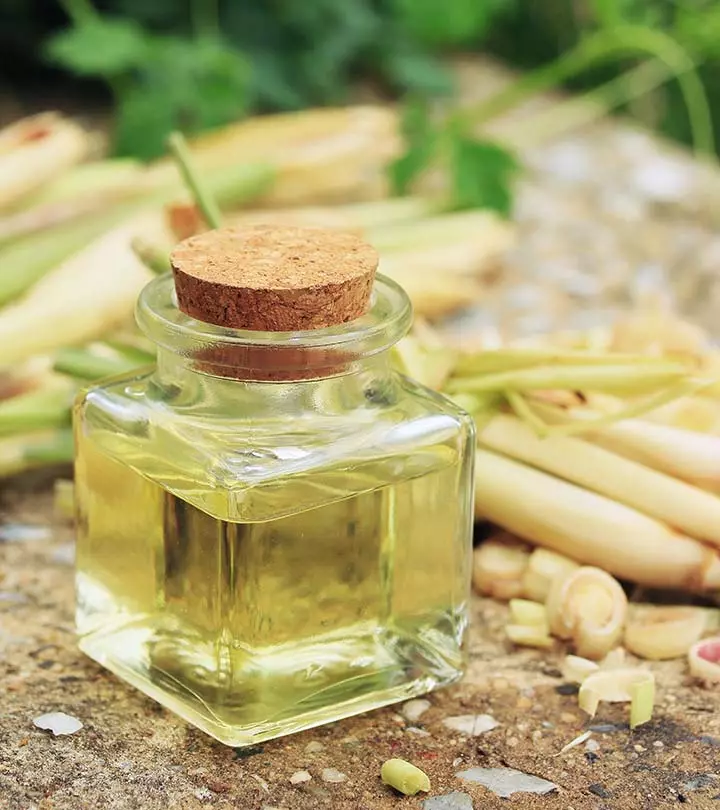
Image: Shutterstock
Lemongrass essential oil benefits might make you want to use it. The oil is derived from lemongrass, a slender grass with remarkable healing properties. Lemongrass oil is used for its antifungal, antioxidant, antiseptic, anti-inflammatory, and insecticidal properties. The fresh lemony aroma of this essential oil can help manage pain. This article discusses the benefits of lemongrass essential oil, how to use it, and its risks. Take a look.
 Know Your Ingredient: Lemongrass Essential Oil
Know Your Ingredient: Lemongrass Essential OilWhat Is It?
An essential oil extracted from the lemongrass plant.
What Are Its Benefits?
It can help prevent microbial infections, pain, and inflammation, improve digestion and immunity, lower cholesterol levels, aid treatments of nervous disorders and cancer, and improve skin and hair health.
Who Can Use It?
Safe for use on adult skin in diluted form. Can be applied to all skin and hair types.
How Often?
A few drops of Lemongrass essential oil diluted with a carrier oil can be used daily for skin and hair care.
Caution
Inhaling the oil may cause lung conditions. Intake during pregnancy may also cause miscarriage.
In This Article
What Is Lemongrass Essential Oil Good For?
The compounds in lemongrass oil are known to possess antifungal, antiseptic, anti-inflammatory, and insecticidal properties. And thanks to its antioxidant properties, it can also prevent the growth of yeast (1).
These properties translate into benefits for digestion, neural health, muscle pains, immunity, and skin and hair health. All of which we will understand now.
Key Takeaways
- Lemongrass essential oil’s antifungal properties can aid in treating nail fungus.
- It exhibits relaxing effects that can calm the mind, thereby beneficial in treating depression and supporting good sleep.
- The oil can help alleviate muscle cramps and increase blood circulation in the body.
- Lemongrass oil carries antimicrobial properties that can aid in treating skin conditions such as cold sores and cellulite.
What Are The Benefits Of Lemongrass Essential Oil?
1. Lemongrass Essential Oil Helps Regulate Cholesterol

Various studies have shown that the consumption of lemongrass oil can sustain healthy levels of triglycerides in the body, thereby bringing down the levels of LDL (the bad cholesterol). This results in the unobstructed flow of blood through the arteries, cutting cardiac disease risk.
In a Brazilian study, the intake of lemongrass essential oil was found to be safe and effective in lowering the blood cholesterol levels (2).
2. Aids Cancer Treatment
Some preliminary studies have shown how lemongrass can inhibit the early stages of liver cancer.

The oil also contains a compound called citral, which was found to inhibit the growth of lung cancer cells. The essential oil, alone or in combination with other chemotherapeutic agents, was found to aid cancer treatment (3).
The anti-inflammatory properties of lemongrass oil also help in cancer treatment. And according to other studies, essential oils like lemongrass can offer protection against cervival cancer (4).
3. Promotes Digestive Health
Lemongrass oil has the incredible ability to treat a number of digestive disorders – these include stomach gas, irritation in the stomach and the bowels, etc
. The oil can also play a superb role in treating gastric ulcers and stimulating digestion. It also treats stomach upsets and is usually taken with tea for its stomach-calming effects (5).
The antibacterial properties of lemongrass essential oil also kill intestinal bacteria and can even help treat diarrhea and nausea.
4. Lemongrass Essential Oil Might Treat Gout

The oil’s anti-inflammatory properties can help treat gout. However, more research is warranted in this regard.
5. Boosts Nervous System Health
Lemongrass essential oil acts as an essential tonic to the nervous system in general.
It aids the treatment of various nervous disorders like Parkinson’s diseasei A progressive neurologic condition that damages nerves and causes uncontrollable movement, causing tremors and stiffness. , Alzheimer’s diseasei A neurologic disorder that shrinks and kills brain cells and progressively worsens, leading to severe disorientation and memory loss. , convulsions, lack of reflexes, etc. It does this by strengthening the nerves in the body and stimulating them.
6. Relieves Headaches
Lemongrass essential oil has calming and soothing effects that can relieve pain, pressure, and tension like magic and keep those menacing headaches at bay. According to an Indian study, lemongrass essential oil can treat headaches (6).
According to an Algerian study, lemongrass essential oil has the potential for developing drugs that can fight fungal infections and skin inflammation (7).
7. Lemongrass Essential Oil Detoxifies The Body
It is also used as a digestive aid as the oil detoxes the liver, digestive tract, kidneys, bladder, and the pancreas. This detoxifying property of lemongrass oil can be attributed to its diuretic nature.
You can simply add lemongrass oil to your soup or tea and keep your system clean.
8. Lemongrass Essential Oil Works As A Natural Deodorizer

Deodorants are important – but most of those we see on TV can harm our skin. This is where lemongrass essential oil comes into play. It is a natural and safe air freshener and deodorizer. Simply add the oil to water and use it as a mist or as an oil diffuser or vaporizer.
 Fun Fact
Fun Fact9. Works As A Muscle Relaxant
This is because the oil improves blood circulation, thereby relieving muscle spasms, sprains, aches, and cramps. You can simply rub some diluted lemongrass oil on your body or make your own lemongrass oil foot bath. You can also try massage therapy using this oil, to achieve effective results, and even use essential oils blends for a more aromatic feel.
Sarah, a blogger with a penchant for natural remedies, discusses the many uses of lemongrass essential oil. She writes, “One morning I woke up and I didn’t have my compression stocking on and my leg was aching. I put some lemongrass and coconut oil on and after awhile I noticed my leg didn’t hurt (i).” She adds that she uses the same remedy for her daughter’s nightly leg cramps.
Lemongrass essential oil was also found to relieve other muscle issues like plantar fasciitisi Inflammation of the tissue at the bottom of the feet, from the heel bone to the toes, causing acute heel pain. and lymphedemai Swelling in peripheral parts of the body due to lymphatic system obstruction brought on by loss of or damage to lymph nodes which may help in relaxation. We only have some reputable sources confirming it, though. Studies are yet to be done.
10. Might Enhance Thyroid Health
Some sources say that lemongrass essential oil can help deal with hypothyroidism. Simply rubbing two to four drops of the oil on the thyroid area might help.
However, we need more research on this. Please consult your doctor before using the oil for this purpose.
11. Can Boost Immunity

Lemongrass facilitates the absorption of nutrients in your body, thereby helping strengthen the body and acting as an immune system booster. This eventually protects your system from disease and keeps it functioning well for a long time.
The immune-boosting effects of lemongrass essential oil also help combat cold and fever. The oil also accelerates wound healing.
 Quick Tip
Quick Tip12. Aids Sleep
Lemongrass oil
has excellent soothing and calming effects on the mind. According to an Algerian study, lemongrass oil may have sedative effects (8). The oil can also help treat depression. Adding a couple of drops in your diffuser and then inhaling it can help.
One Indian study states that lemongrass oil can be used as a good alternative to chemical mouthwashes (9).
13. Treats Varicose Veins
Though research is limited, theoretical data suggest that essential oils like lemongrass can increase circulation and reduce swelling. This can help ease the condition.
You can create a warm compress by soaking a clean cloth in a mixture of five drops of lemongrass essential oil and one liter of water. Apply this compress to the affected area for 15 minutes. Ensure you keep your legs elevated all the while.
14. Treats Nail Fungus
The antifungal properties of lemongrass essential oil can help treat nail fungus. You can first dilute the oil with a carrier oil like olive or grapeseed oil. Pour 1 ounce of the carrier oil into a clean bottle and add six drops of lemongrass oil to it. Close the lid and shake properly. Massage this oil into the infected nail twice daily. Within a few days, you will observe the fungus turning black or brown – which means it is drying. Healthy nail growth should follow.
15. Can Treat Skin Issues

Lemongrass essential oil, known for its excellent antimicrobial properties, can aid the treatment of a host of skin conditions. These include candida, cellulite, and even cold sores.
For candida, you can just massage a few drops of the oil into the affected areas, twice a day. You can use this oil for treating oral thrush as well – simply mix one tablespoon of coconut oil with three drops of lemongrass oil and take a mouthful of it. Swish for 10 minutes and then spit it out. Rinse your mouth well. Do this once daily.
Massaging the affected areas with lemongrass oil can also help reduce cellulite – thanks to its diuretic properties, it reduces fluid retention.
You can also use this oil for treating cold sores. Simply mix five drops of lemongrass essential oil with two tablespoons of coconut oil. Apply this mixture to the affected areas and let it get absorbed naturally. Do it once or twice daily.
The anti-inflammatory properties of lemongrass oil can even ease skin irritation. You can add a few drops of the oil to your bath and let the oil soothe your skin.
You can also use the oil in your skincare regime—try adding it in a facial steam for treating acne. The antimicrobial properties of the oil remove the bacteria trapped in the pores – and its anti-inflammatory properties treat the skin inflammation caused by acne.
16. Boosts Hair Strength
Lemongrass is one of the best natural remedies for hair strength; due to its antibacterial properties, it creates a conducive environment on your scalp for healthy hair growth. It strengthens hair follicles. You can mix three drops of lemongrass essential oil with three tablespoons of raw olive oil and massage into your hair. Wrap a towel around your head for 15 minutes, post which you can shampoo as usual (use an organic shampoo).
This procedure can help kill hair lice as well.
The aforementioned benefits of lemongrass essential oil can be enjoyed in multiple ways. Some of them are listed below.
How To Use Lemongrass Essential Oil?
Here are a few ways you can use lemongrass essential oil:
- Aromatherapy
- Add a few drops of lemongrass essential oil in an oil burner or a diffuser.
- Inhaling this aroma can promote relaxation and reduce stress.
- Massage
- Add 1-2 drops of lemongrass essential oil to 1 tablespoon of a carrier oil, such as coconut or almond oil.
- Gently massage the oil on your body to alleviate muscle pain and tension.
- Bath
- Add a few drops of lemongrass essential oil to your bathwater for a relaxing and rejuvenating experience.
- These are the many ways lemongrass essential oil can make your life better. But there is something else you need to know.
Caution: Always mix lemongrass essential oil with a carrier oil before applying it to your skin as it is a potent ingredient and can cause irritation. If you are using it for the first time, do a patch test to ensure you do not have an allergic reaction.
What Are The Side Effects Of Lemongrass Essential Oil?
- Lung Issues
Some cases state the occurrence of lung problems post inhaling lemongrass essential oil. If you have a preexisting respiratory condition, please consult your doctor before using the oil for aromatherapy or inhaling.
- Issues During Pregnancy And Breastfeeding
The oil can cause menstrual flow and might lead to miscarriage if taken during pregnancy. We don’t know what would happen if the oil is taken during breastfeeding. Hence, stay safe and avoid intake in both the cases.
There is a slight possibility of drug interactions, as lemongrass oil might affect how certain medications are processed in the body. This could potentially alter their effectiveness (10). More studies are needed to fully understand these effects.
Watch this captivating video to learn how lemongrass essential oil can work wonders in enhancing your health and overall well-being. Embark on a journey towards a healthier life.
Lemongrass essential oil benefits your health in several ways, primarily due to its antifungal, antiseptic, anti-inflammatory, and insecticide properties. While it helps boost your cardiovascular, nervous, and digestive health, due to its analgesic nature, it helps relax your muscle knots, pains, and headaches as well. It not only is beneficial for your skin and hair health but also helps detoxify your system and help you sleep well too. You can use an aromatherapy diffuser to use this oil and gain effective results. It may also act as an insect repellent. While its benefits are well established, pregnant or breastfeeding women and people with respiratory conditions should avoid lemongrass oil in any form.
Frequently Asked Questions
What is the difference between lemongrass oil and lemon oil?
Though both are essential oils with similar properties and benefits, the two come from different plants. While lemongrass oil comes from the Cymbopogon citratus plant, a grass that is native to India, lemon oil comes from the Citrus limon tree that is native to China.
Is lemongrass oil edible?
Intake of lemongrass oil might have toxic effects. Hence, please consult your doctor before ingesting it.
Where can I buy lemongrass oil?
You can get the oil from your nearest supermarket or online at Walmart and Amazon.
Is lemongrass essential oil safe for babies?
There is very limited information on this. Hence, it is best to avoid use. Consult your doctor in this regard.
Does lemongrass reduce anxiety?
Yes, studies suggest that lemongrass aroma may reduce anxiety. However, further studies are required (11).
Does lemongrass essential oil give you energy?
Anecdotal evidence suggests that lemon essential oil may boost physical and mental energy. However, more studies need to be done to support this claim.
Is lemongrass good for hormonal imbalance?
Yes, animal studies indicate that lemongrass extracts may help increase Thyroid stimulating hormone (TSH) and Triiodothyronine (T3) hormone levels. This may indicate that your thyroid is not producing enough hormone and may result in hypothyroidism, (12). However, further studies are warranted.
Is lemongrass good for detox?
Yes, lemongrass contains antioxidants and other beneficial compounds that may help detoxify toxic free radicals. This may help protect the liver from peroxide-induced oxidative damage and prevent liver injury (13).
Is lemongrass good for the sinuses?
Yes, lemongrass is good for sinuses. Studies suggest that lemongrass tea benefits include relieving cough and soothing nasal congestion (14).
Is lemongrass oil good for weight loss?
Yes, lemongrass contains citral, a compound that may reduce fat accumulation and improve insulin sensitivity. This may reduce overall body weight (15).
Illustration: Lemongrass Essential Oil Benefits & Possible Side Effects
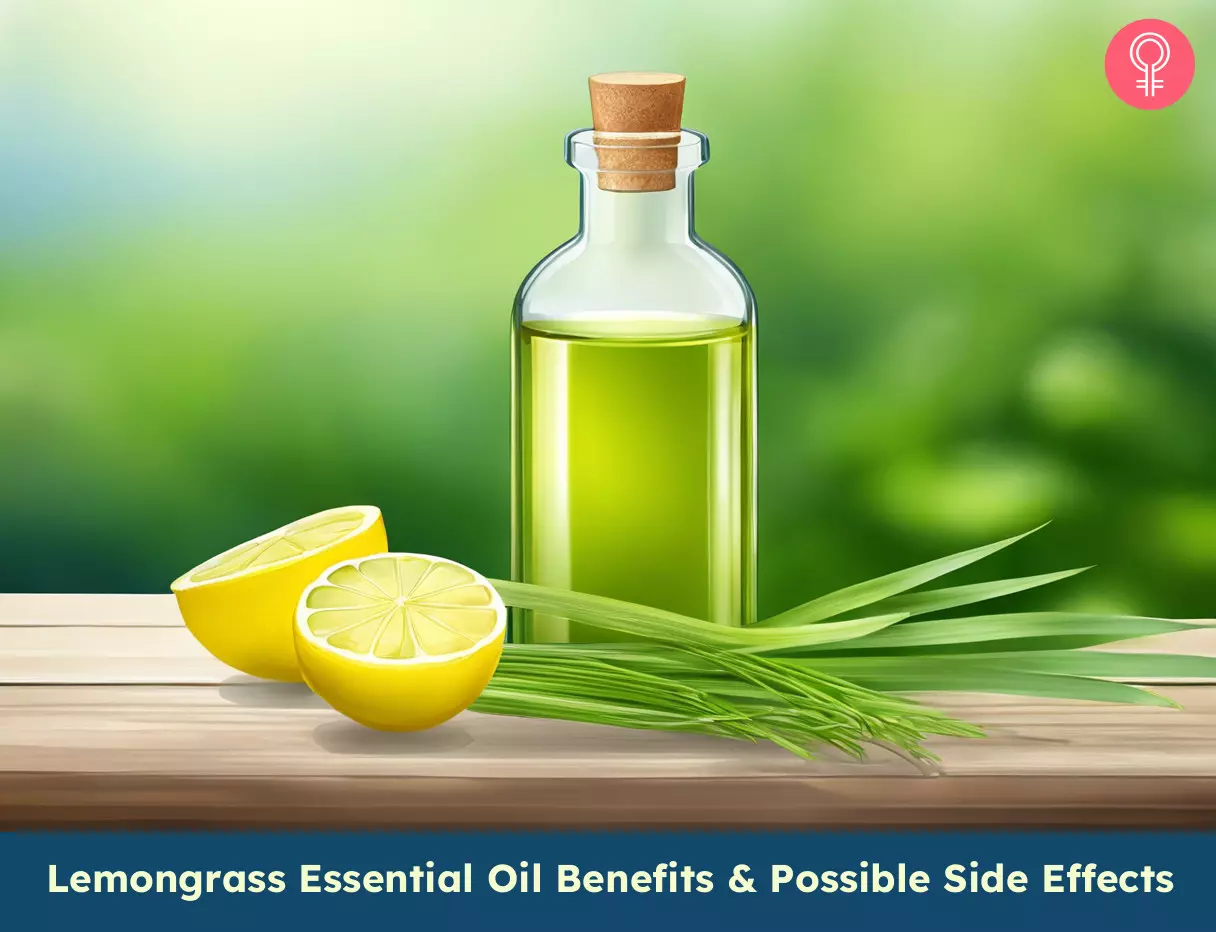
Image: Stable Diffusion/StyleCraze Design Team
Personal Experience: Source
StyleCraze's articles are interwoven with authentic personal narratives that provide depth and resonance to our content. Below are the sources of the personal accounts referenced in this article.
i. Who knew Lemongrass Essential Oil had so many uses!https://theoilysisters.wordpress.com/2015/03/02/who-knew-lemongrass-essential-oil-had-so-many-uses/
References
Articles on StyleCraze are backed by verified information from peer-reviewed and academic research papers, reputed organizations, research institutions, and medical associations to ensure accuracy and relevance. Read our editorial policy to learn more.
- “Lemongrass essential oil demonstrated…”. US National Library of Medicine.
- “Cholesterol reduction and lack of…”. US National Library of Medicine.
- “Lemongrass essential oil and citral inhibit…”. US National Library of Medicine.
- “Anticancer effects of lemongrass oil and citral on cervical cancer”. ResearchGate.
- “Items and their uses”. Arizona State University.
- “Scientific basis for the…”. US National Library of Medicine.
- “Lemon grass essential oil as a potent…”. US National Library of Medicine.
- “Lemon grass…”. US National Library of Medicine.
- “Efficacy of 0.25% lemongrass oil mouthwash…”. US National Library of Medicine.
- “Effects of lemongrass oil and citral on hepatic drug-metabolizing enzymes, oxidative stress, and acetaminophen toxicity in rats” US National Library of Medicine.
- “Effect of Lemongrass Aroma…” US National Library of Medicine.
- “Hypothyroidism” ResearchGate
- “Hepatoprotective Effect of …” US National Library of Medicine.
- “Lemongrass Essential Oil Components…” US National Library of Medicine.
- “Effects of citral, a naturally occurring…”US National Library of Medicine.
Read full bio of Dr. Scott Johnson
Read full bio of Ravi Teja Tadimalla
Read full bio of Arshiya Syeda
Read full bio of Aparna Mallampalli







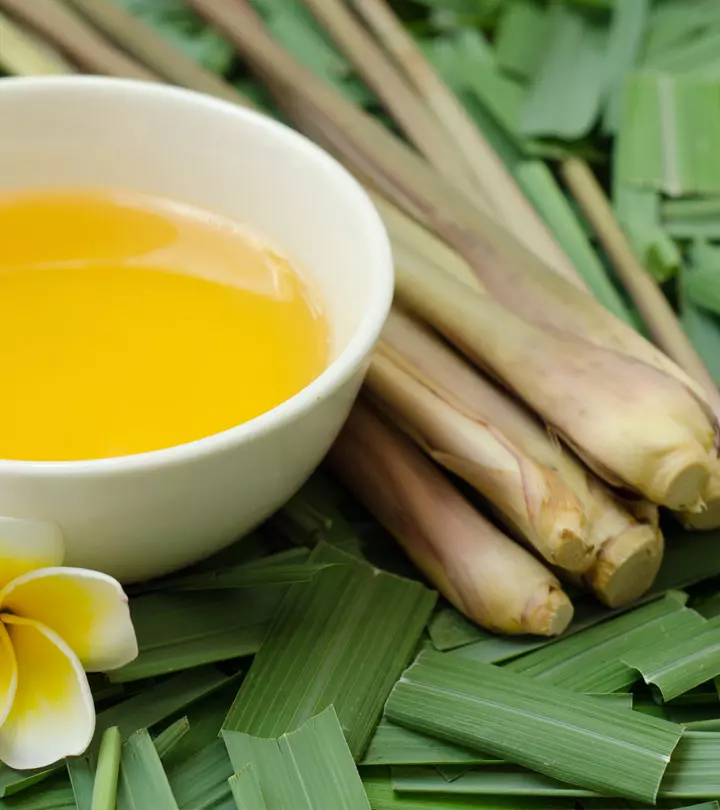



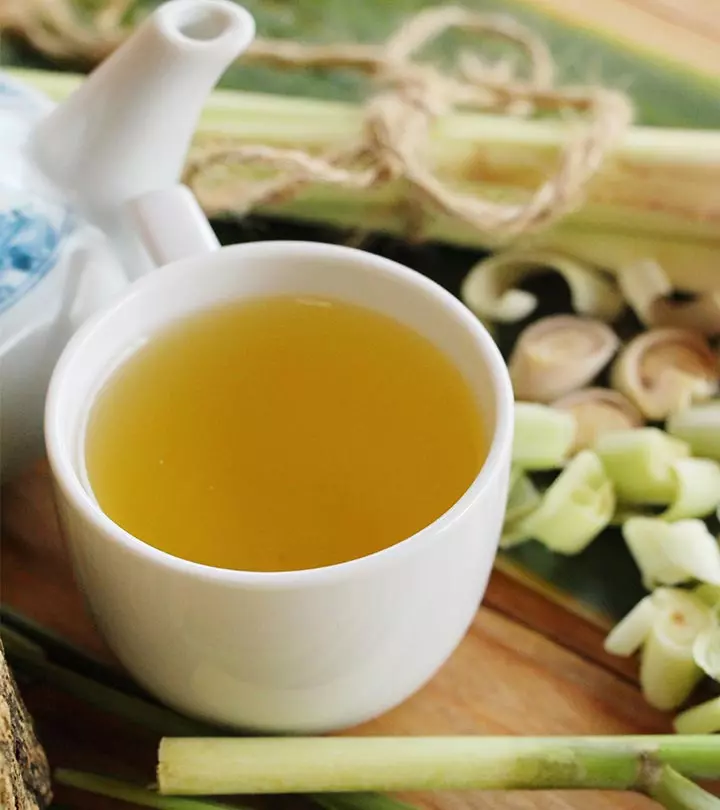




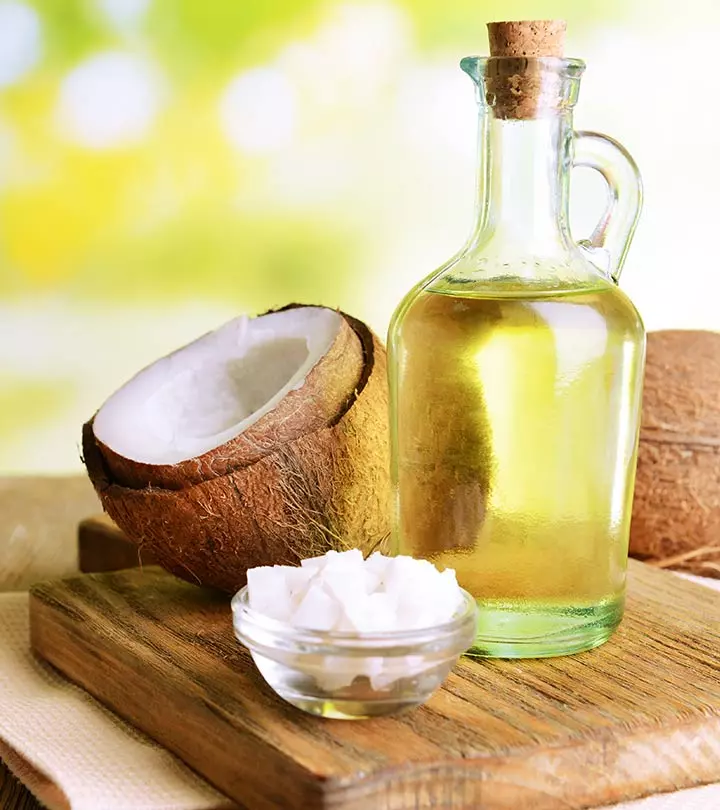

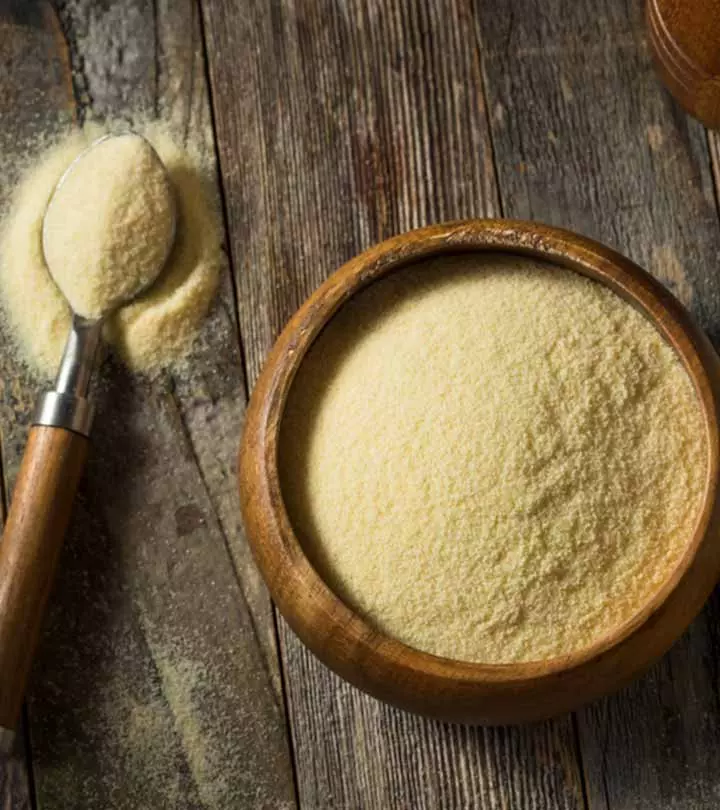




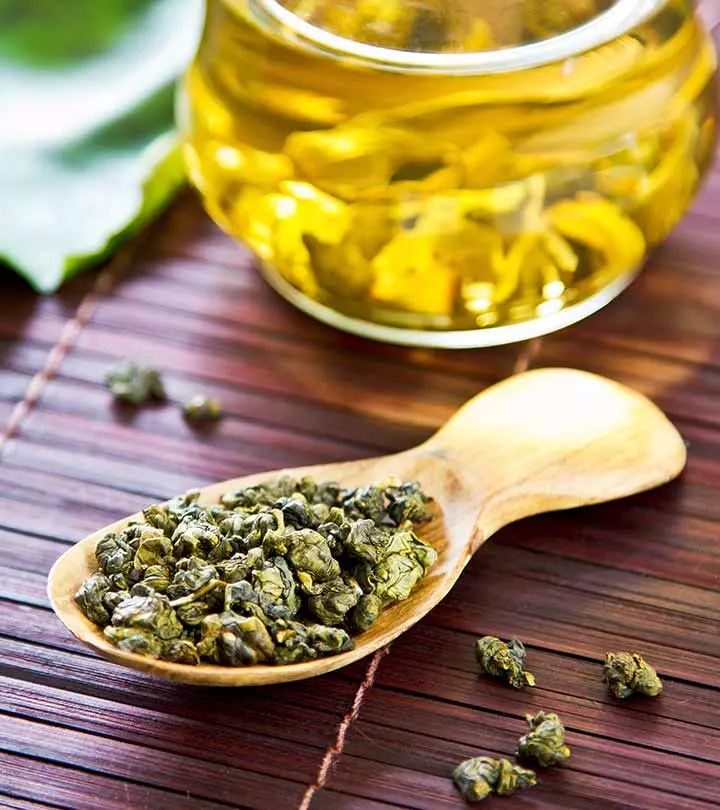
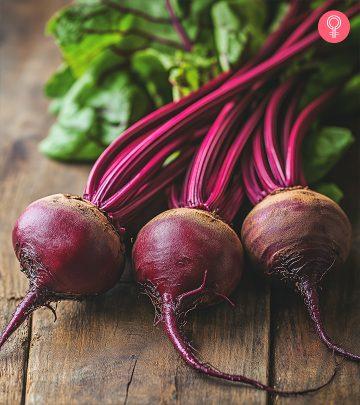
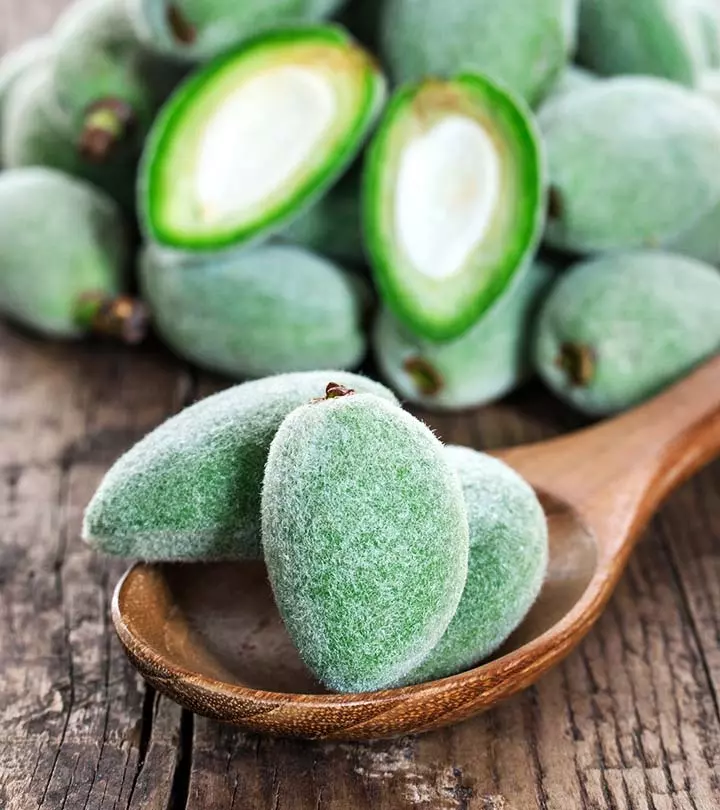
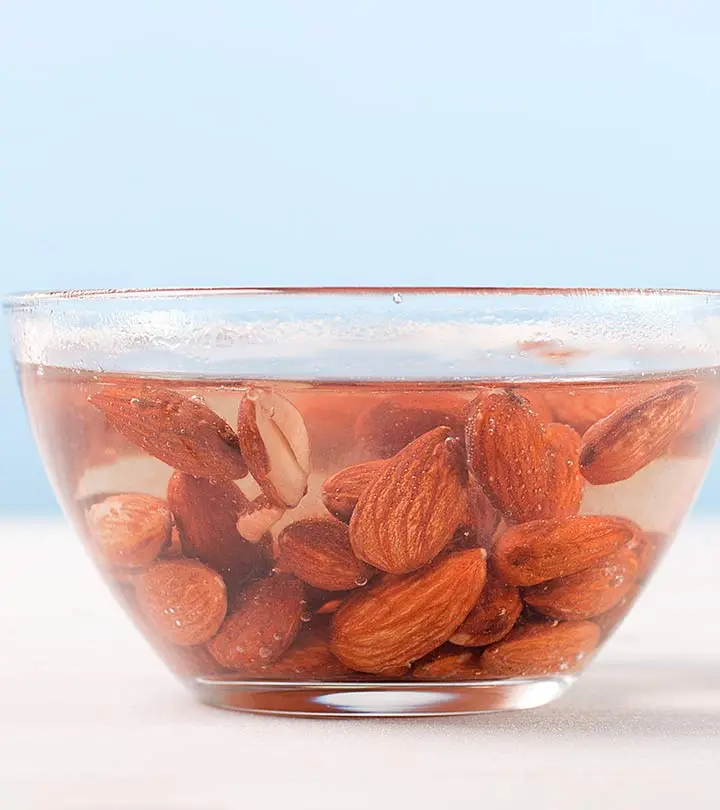

Community Experiences
Join the conversation and become a part of our empowering community! Share your stories, experiences, and insights to connect with other beauty, lifestyle, and health enthusiasts.